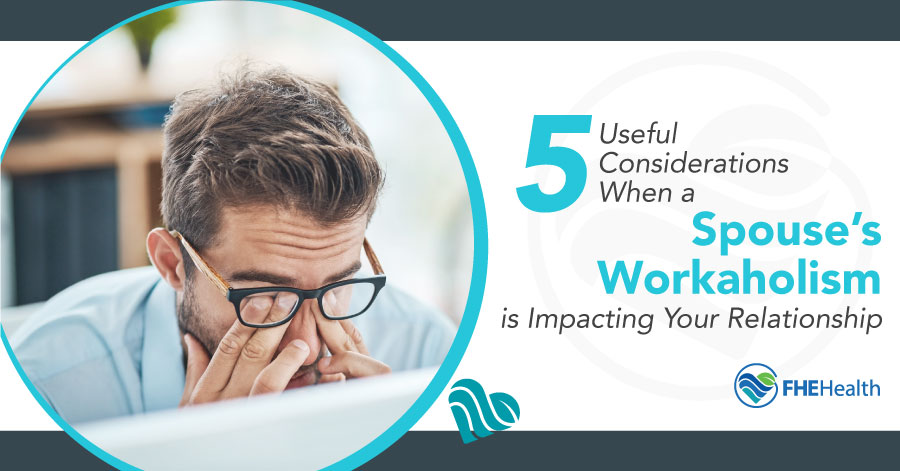
Could your loved one be addicted to work? What do you do when your husband works so much that you feel he is missing out on key time with the kids? What about the wife who is unable to attend the kids’ games or important family functions? Working long hours isn’t uncommon in many situations. Knowing when a person is working too much, though, is more challenging. You can learn how to help a workaholic, but first, you need to consider if your loved one is working too much.
Here are five considerations to think about when wondering how to help a workaholic.
1. Learn What a Workaholic Is
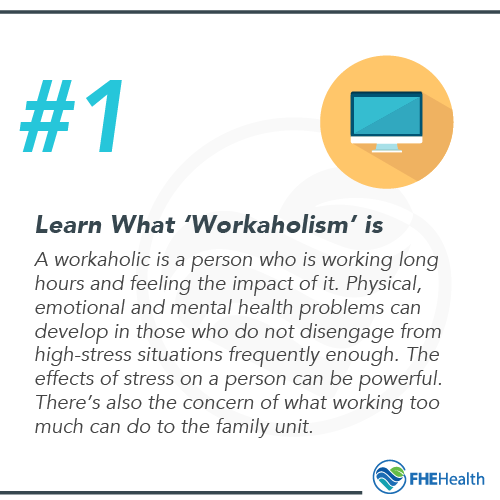 A survey released by the U.S. Travel Association, Ipsos and Oxford Economics found that 768 million days of vacation time were not used in the US in 2019. That means employees gave up $65.5 billion in benefits. For some people, there’s a worry that missing work time could mean a job is at risk. For others, it may feel like there’s no reason to take time off. While a break may be nice, some people find it difficult not to fill in time they would normally work with valuable tasks during vacation days.
A survey released by the U.S. Travel Association, Ipsos and Oxford Economics found that 768 million days of vacation time were not used in the US in 2019. That means employees gave up $65.5 billion in benefits. For some people, there’s a worry that missing work time could mean a job is at risk. For others, it may feel like there’s no reason to take time off. While a break may be nice, some people find it difficult not to fill in time they would normally work with valuable tasks during vacation days.
A workaholic is a person who is working long hours and feeling the impact of it. Physical, emotional and mental health problems can develop in those who do not disengage from high-stress situations frequently enough. The effects of stress on a person can be powerful. There’s also the concern of what working too much can do to the family unit.
Working too much isn’t a type of mental health disorder. While your loved one may seem like they are addicted to work, there are no real addictive qualities here like drugs and alcohol. However, there are concerns, especially when your loved one’s mental health is taxed due to high-stress levels.
2. Know the Signs Your Loved One Is Working Too Much
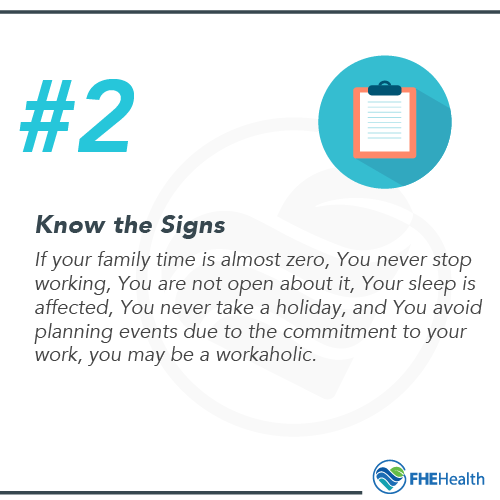 Is your loved one overworked? Are they okay, or should you intervene? Here are some signs your loved one may be working too hard.
Is your loved one overworked? Are they okay, or should you intervene? Here are some signs your loved one may be working too hard.
- Your loved one is emotionally and/or physically exhausted on a regular basis.
- Chronic fatigue or insomnia is a problem.
- Physical symptoms of stress can occur. This includes chest pain, gastrointestinal pain and heart palpitations. Some people experience frequent headaches or faint from dizziness.
- They may not eat much or eat a very poor diet.
- They may experience symptoms of anxiety and depression, especially in individuals predisposed to mental health conditions.
- Stress and strain within relationships develop.
- Some individuals isolate themselves, pushing others out of their lives.
It’s sometimes difficult to define if a person is a workaholic or if they simply have poor time management skills. In other cases, your family member may love what they do and find purpose in it. This makes determining when you should help a bit more difficult.
3. Understand Why People Work Too Much
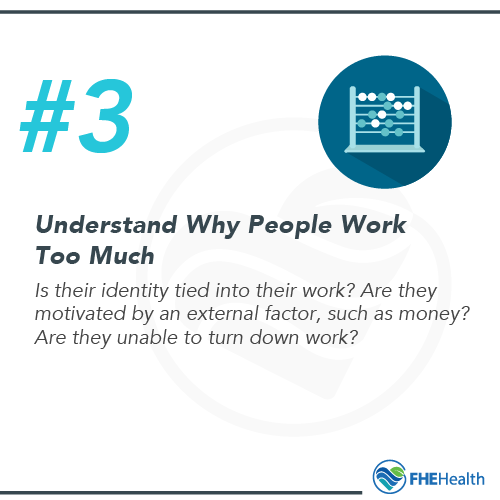 From someone looking on, it can be hard to see why anyone would want to work so hard. Often, it’s not about their family or relationships but something else.
From someone looking on, it can be hard to see why anyone would want to work so hard. Often, it’s not about their family or relationships but something else.
- Some people feel defined by how well they do at work. They feel good about themselves because they are successful.
- Some people are highly motivated by what they do at work. They love the experience and even feel a thrill from it.
- Others work hard due to behavioral factors, such as believing they have to do so to make enough money.
Speaking to your loved one, without criticism, about why they work so much can help. In some cases, this can give you peace of mind. In others, it can give you the support you need to take action.
4. Recognize the Negative Aspects of Working Too Hard
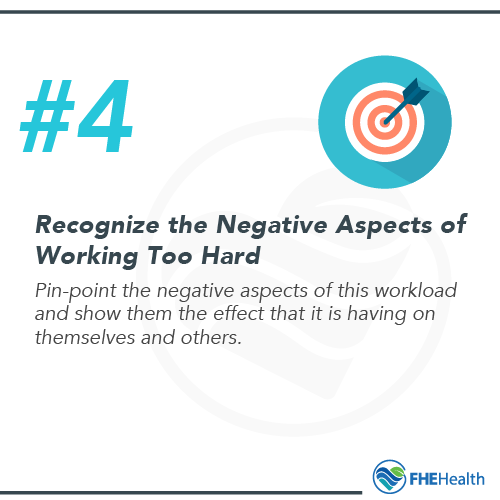 You can learn how to help someone who is stressed out if you can pinpoint the actual negative side effects the stress is creating. What is the impact of overworking? Look at both how it impacts you, as the friend or family member, and others.
You can learn how to help someone who is stressed out if you can pinpoint the actual negative side effects the stress is creating. What is the impact of overworking? Look at both how it impacts you, as the friend or family member, and others.
- Is working too much creating difficulty mentally disengaging from work tasks? If your loved one is working all of the time, they could be missing key moments within your family.
- Do you feel less important to your loved one than work? If so, discuss how this is impacting your daily life.
- Is the stress creating a dangerous situation in your home? Emotional stress can create aggression.
- Is your loved one suffering physical problems, such as stress-related heart issues? Are they eating poorly and skipping exercise?
- How is your loved one’s quality of life? Look at it from their point of view. Do they enjoy what they are doing, or do they dread every day?
When these negative outcomes are occurring, it’s time to find some help. It may be a new job, but it may just be better time management skills. Discuss the concerns you have about your loved one’s work habits without adding more stress to the situation.
5. Know When Your Loved One Is Damaging Their Mental Well-Being
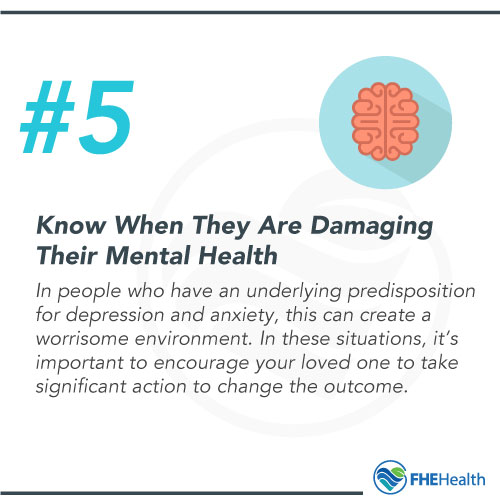 What do you do when your wife works too much and you miss seeing her? How do you convince your husband that time at home is important, too? It’s important to look at it from a mental health view.
What do you do when your wife works too much and you miss seeing her? How do you convince your husband that time at home is important, too? It’s important to look at it from a mental health view.
If your loved one is struggling with depression, anxiety and overwhelming stress, this can impact mental health. In people who have an underlying predisposition for depression and anxiety, this can create a worrisome environment. In these situations, it’s important to encourage your loved one to take significant action to change the outcome. That may include:
- Taking a trip away for a few days or a week
- Putting the phone away or not checking email at home
- Making sure there is at least one day a week when work isn’t on their mind
- Discussing the benefits of working with a therapist to uncover stressors or potential stress-relief methods
- Seeking ways to alleviate some of the financial burden, if that’s a component of their reason for working so much
Sometimes people believe they are working hard to support the family, and if you tell them they are wrong for doing so, they can become defensive. If you’re truly worried about their mental health, focus on that aspect of change.
FHE Health Offers Supportive Solutions
When your loved one is at risk of depression or debilitating anxiety, don’t wait to reach out for help. FHE Health offers compassionate counselors ready to help you at 833-596-3502.






